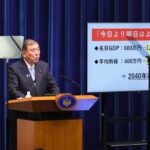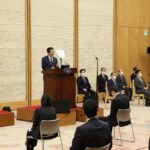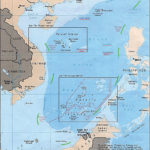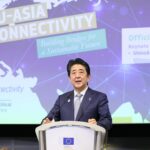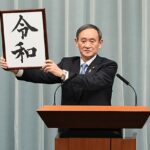“The domestic issues caused by former Prime Minister Abe’s death appear to have significantly impacted his diplomatic legacy” — Sano Kentaro comments on the challenges facing Japan’s Kishida administration.
It is feared that global developments such as US-China tensions, the COVID-19 pandemic and the Ukraine crisis are causing the world to turn inward. Since the Abe Shinzo administration, Japan has been stuck in a situation where it has no choice but to focus on its many domestic challenges. Such an inward turn could land Japan in a serious situation in the future.
Abe diplomacy, a term used to describe Abe’s trips around the world under the banner “diplomacy that takes a panoramic perspective of the world map,” proposed the “Free and Open Indo-Pacific (FOIP)” initiative, promoted free and open multilateral trade, and led to the conclusion of trade agreements such as the TPP11 and Japan-EU Economic Partnership Agreement and others. This proactive diplomatic posture came to an end when Abe resigned due to ill health in August 2020. Prime Minister Suga Yoshihide, who took over from Abe the following month, made the US and Southeast Asia his priorities for diplomacy whilst battling COVID at home, but his only memorable diplomatic move was perhaps the carbon-neutral declaration. Kishida Fumio, who became Prime Minister after Suga in October 2021, advocated an economic policy dubbed a “new form of capitalism” and rolled out policies aimed at raising wages as part of his commitment to push for a broader distribution of wealth; however, he has been forced to focus on the problems cropping up one after another at home and has failed to fully carry on Abe’s diplomatic legacy.
On July 8, 2022, just before the upper house election which was Prime Minister Kishida’s second national election since the inauguration of his administration, Abe was gunned down whilst giving a campaign speech. The Kishida administration decided to hold a state funeral on September 27 to clearly show Japan’s resolve that its democracy will not yield to violence, whilst at the same time pinning hopes on funeral diplomacy. However, the funeral failed to produce the expected results, with influential foreign leaders deciding not to attend given the changing circumstances in the two-and-a-half months since Abe’s death.
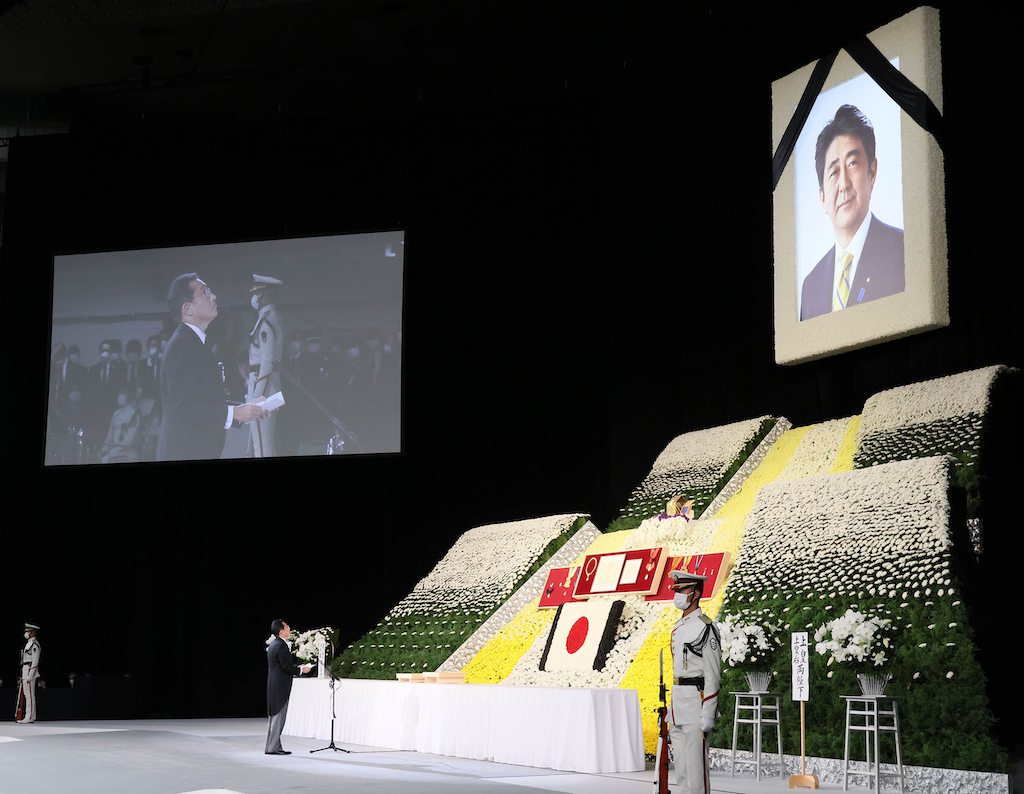
At the State Funeral for the late Prime Minister Abe Shinzo on September 27, 2022, Prime Minister Kishida said, “It was Mr. Abe Shinzo who made the greatest efforts of anyone, anywhere on earth to maintain and improve an open international order that values freedom, democracy, human rights, and the rule of law and forms a dependable roof that enables the security of Japan, the region, and indeed the entire world.”
Photo: Cabinet Public Affairs Office
A more inward-looking Japan due to Abe’s death
Abe’s death left problems at home.
The first problem is the state funeral and religion debate. The process by which the Kishida administration decided to hold a state funeral for Abe and the legal basis for the decision can hardly be described as clear and an NHK opinion poll showed 32 percent of respondents approved of the plan, while 57 percent disapproved. A collection of opinions from experts released by the government in December 2022 indicated the view that there was nothing wrong with the Kishida administration’s judgment or procedure, which was a sensible response as a nation; however, it was also pointed out that involvement of the Diet would have been desirable and offering condolences is a personal choice and so the decision to stage a state funeral had divided public opinion.
The second problem is the motive in Abe’s assassination. The assassin’s life had been ruined by his mother’s huge donations to a religious group and he murdered Abe believing that Abe was tied to the religious group. The religious group is alleged to have used “fortune-telling fraud” to scare people into buying trinkets and extorted large donations from its followers, and when links between this group and Diet members from the ruling party were uncovered, the Kishida administration was forced into action. An NHK opinion poll showed 82 percent of respondents were unsatisfied with the action taken, criticizing the lack of explanation. The focus of the debate then shifted to legislation to help victims of this religious group. On December 10, 2022, which was the last day of the extraordinary session of the Diet which began on October 3, a bill was passed, after the ruling parties made concessions to the opposition, and an NHK opinion poll showed that 66% of respondents approved of the bill (with 18% approving very much and 48% approving somewhat). However, in the meantime, the Kishida administration’s approval rate continued to fall (see figure), with three cabinet ministers forced to resign over this issue and funding-related scandals.
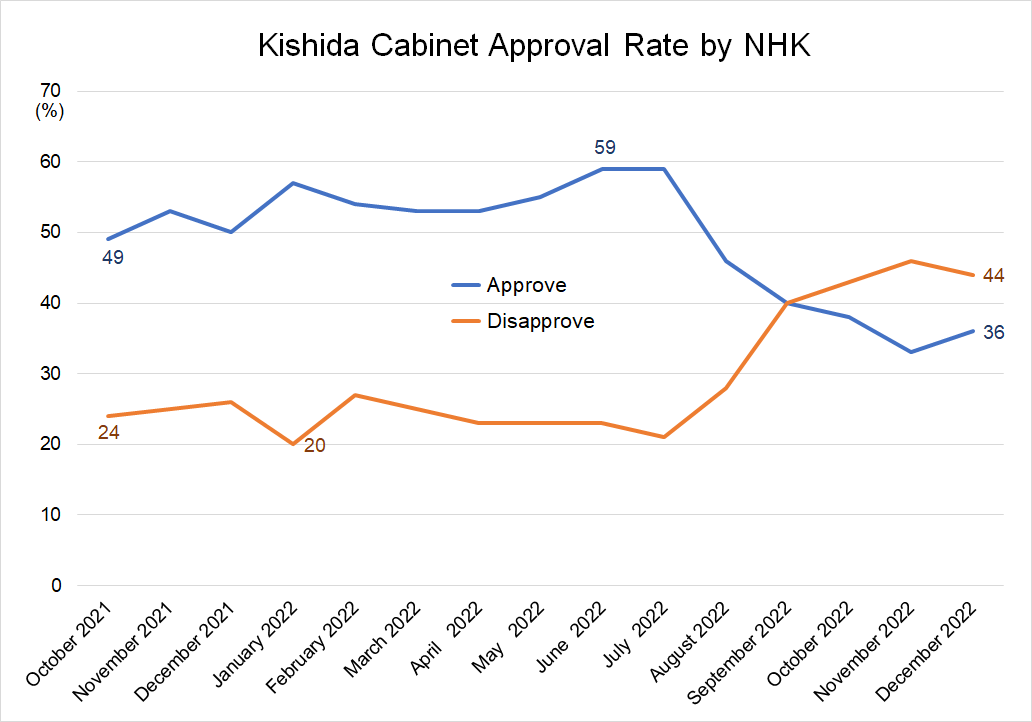
The third problem is the strengthening of Japan’s defense capability initiated by Abe.
After Abe’s death, awareness of defense in Japan changed. In retaliation for US House Speaker Nancy Pelosi’s visit to Taiwan in August 2022, China conducted military drills surrounding the island of Taiwan and some of the missiles launched in the drills fell in Japan’s EEZ. In addition, global events such as Russia’s invasion of Ukraine, which has no end in sight, China-Russia joint military drills near Japan, China’s provocations in the East China Sea, and North Korea’s unprecedented number of missile tests have created a sense of crisis, with an NHK opinion poll showing that 82% of respondents believe Japan’s security environment will be affected (with 40% believing it will be greatly affected and 42% believing it will be somewhat affected). Taking such circumstances into consideration, the Kishida administration announced on December 16 that the cabinet had approved revisions to three security documents, including plans for counterattack capabilities (strike capability against enemy bases). An NHK opinion poll showed that 55% of respondents approved of the government’s proposal to develop counterattack capabilities, with 31% opposed. The “peace-addicted” Japanese are at last starting to wake up to the importance of national defense.
However, the three security documents caused another major problem. In order to develop future counterattack capabilities, the government decided to secure around 43 trillion yen in defense costs over the next five years from 2023 to 2027; however, this will take Japan’s annual defense budget to more than 11 trillion yen. Again with insufficient prior consultation, Prime Minister Kishida declared that, instead of issuing government bonds, he would fund the increase in defense spending by raising taxes, more specifically, raising the corporate tax rate. An NHK opinion poll showed that 51% of respondents approved of the scale of the budget, with 36% opposed, and that 61% approved of funding the increased spending by raising the corporate tax rate, with 34% opposed. This may reflect the fact that most people agreed with Prime Minister Kishida’s remarks that paying for the investment by issuing government bonds would be making future generations deal with the problems of the current generation. However, the plan to get companies to agree to increase wages under a “new form of capitalism” whilst at the same time raising the corporate tax rate does not make a great deal of sense. The plan drew a backlash from the opposition and from inside the LDP and also prompted a cabinet rebellion. The details and timing of the tax hike have yet to be worked out but are unlikely to be finalized easily.
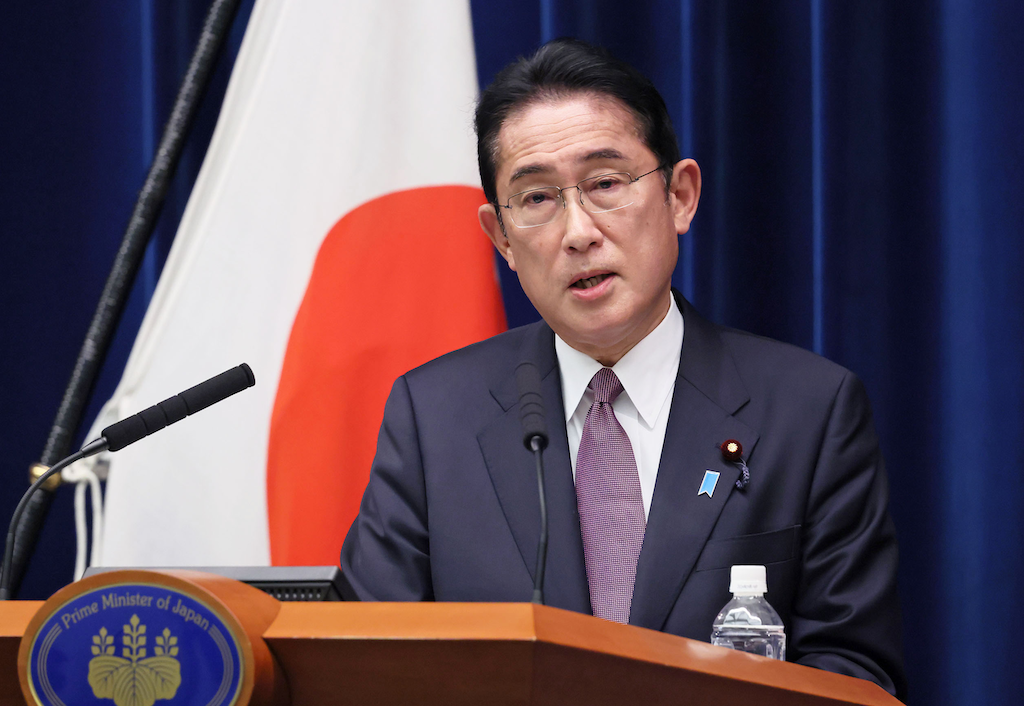
Prime Minister Kishida declared that, instead of issuing government bonds, he would fund the increase in defense spending by raising taxes, more specifically, raising the corporate tax rate. However, the discussion is yet to begin, and there is the possibility that the debate will divide national opinion into two.
Photo: Cabinet Public Affairs Office
The final problem is that in December the government reversed its policy of reducing the use of nuclear power and adopted a new policy promoting greater use of nuclear energy.
Briefly, the reasons for the U-turn include that the safety checks for the restart of nuclear power plants (NPPs) required after the Great East Japan Earthquake are nearing completion, Japan has become dependent on fossil fuels in the meantime, and LNG prices have risen due to Russia’s invasion of Ukraine. Key policy shifts include restarting NPPs after safety checks, extending the operating life of a NPP from 40 years to 60 years, developing small NPPs using new technologies, promoting energy savings and renewable energy, and introducing carbon pricing. Through such measures, the government will seek to reduce CO2 emissions, secure energy sources and reduce costs.
However, these policy shifts can also not be said to have been properly discussed and a backlash in Japan, which had come to terms with moving away from nuclear power, can be expected. Japan is also in the grim situation of still not having reached ground zero for starting to truly rebuild the disaster-hit areas. Once again it looks like this U-turn risks splitting the country in two.
The Kishida administration needs to put its heart and soul into explaining the issues underlying its policies as well as its policies. Not only that, it also needs to put a great deal of energy into avoiding dividing the nation.
Kishida diplomacy going forward
At the UN Assembly on September 20, 2022, Prime Minister Kishida criticized Russian aggression saying “Russia’s aggression against Ukraine is an act that tramples on the vision and principles of the UN Charter” and appealed to fellow nations saying “Especially at a time when the existing international order is being tested around the world, now is the time to return to the vision and principles of the UN Charter and mobilize our strength and wisdom to ensure an international order based on the rule of law.” However, the domestic issues caused by Abe’s death appear to have significantly impacted Abe’s diplomatic legacy under the current circumstances.
The revisions to the three national security documents are definitely important for the regional security balance but, under the current circumstances, security measures based on diplomacy, the avoidance of new conflicts and the promotion of free trade in accordance with laws are important and contributing to these areas is Japan’s road to survival. Above all else, Japan’s role is to approach the Ukraine crisis and the nuclear issue as a peaceful nation, stand up for democracy and lead the world as a nation which champions free trade and to make its position on these matters abundantly clear.
The G7 Hiroshima Summit is due to be held in May 2023 on Prime Minister Kishida’s home soil. As the G7 presidency, Prime Minister Kishida will begin his overseas visits in January.
Sano Kentaro is a freelance journalist.

